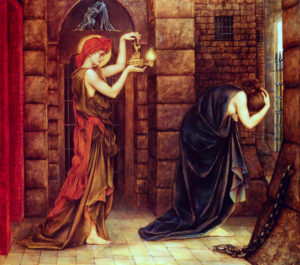
Hope
Hope in a Prison of Despair – Evelyn De Morgan, 1877. Public Domain
Watching the response to the Coronavirus has been like looking at ourselves in a mirror. I am untrained to analyze much of what we see, but I recognize in both the justified and unjustified fear that, for many, a belief in the potential of medicine to provide the next best thing to eternal life is being quickly eroded. We are in the process of watching one of western culture’s great idols, the belief that we can live “forever” through a combination of self-care, diet, exercise, medicine, and so on, come crashing down.
Surgeon and author of Being Mortal Atul Gawande writes about his experiences grappling with the inevitability of death, even in an age of advanced medicine, from the perspective of someone in the medical profession. Gawande writes of his own trauma as a young doctor, suffering from nightmares of patients he could not save, and his shock from “seeing medicine not pull people through.” Gawande realized that he had been trained, like many other doctors, to believe that the ultimate metric for his success was that none of his patients ever die. The absurd impossibility of that standard for success, and the damage the standard was doing on medical treatments and in society at large, motivated him to write Being Mortal, an exploration of practicing medicine in light of death’s reality. Immortality is an unfair and unrealistic burden to place on a doctor, and an unwise way for those outside of the medical profession to live in a world where death is still inevitable.
Written long before Gawande’s reflections on medicine and death, Leo Tolstoy’s short novel, The Death of Ivan Ilyich tells the story of a Russian bureaucrat who falls while hanging curtains. His fall is random and unexpected, and results in his being bed-ridden for some time, and eventually to his death. On his deathbed, Ivan is “tormented” by “the deception, the lie, which for some reason they all accepted, that he was not dying but was simply ill, and he only need keep quiet and undergo a treatment and then something very good would result.” Ivan’s gradual death shocked him, he did not see it coming, and he realized that he had always lived this way, ignoring the inevitable truth that one day he would die. Even before the advent of truly modern medicine, Tolstoy recognized that human beings were prone to place so much hope in medicine that they ignored their coming deaths.
It is not that death is something new, or that other illnesses have not been killing thousands, and even millions in our own time. Death just gets a great deal of our attention right now. Malaria killed 405,000 individuals in 2018, with 248 million new infections in that year, according to the Center for Disease Control. If we received news of those deaths in the same way that we receive daily news updates about Covid-19 cases and deaths, we would have heard of 679,452 new malaria cases per day and 1,110 deaths from malaria per day on average in our news cycle. Yet, because those who suffer from malaria are far away from us in poor countries, we ignore death from this cause and others. Ignoring the inevitability of death has been the norm in recent history: when people begin to age and die they are sent to do so in separate homes, most people die in hospitals, and most of us never have to see dead people. So it comes as a shock, to individuals and a society, to have to remember that we will die, though probably not die from Covid-19. Yet, as we are constantly inundated by statistics and bad news about the spread of the virus it is no wonder that so many feel hopeless, and death feels more inevitable than it has in a long time.
It is in response to this inevitability of death, now staring western culture in the face, where the Church’s response to Coronavirus needs to begin. It is well and good to be civic-minded, share moral messages on social media, remind people to wash their hands or do any number of helpful things. But the Christian response to Coronavirus must be a message of hope in the face of death.
Where can such hope be found? Not ultimately in medicine, vaccines, or special machines, and the promises of an extended life they hold, but only in the life, death, and resurrection of Jesus Christ. For too long, Christians have spoken of Christian faith without talking about death. We have seen the Christian faith as valuable because it is a way to be in community, to be socially active, to transcend beyond our mundane lives, or to shape and influence culture or society. While these may all be true to some degree, none of those values are what Christian faith is really about. The center and foundation of Christian faith, the solid ground where we set our feet as we address the realities of Covid-19, or anything else, is the reality that Christ has defeated death through his death and resurrection, and that for all who believe it is so, they are given the same life as Christ, eternal life beyond death.
As members of the Body of Christ at Christ Church Anglican, we have been given a tremendous opportunity to speak lovingly into a newly opening void in the lives of people shaped by a culture designed to distract us from death and from God. Into that void God speaks, “Behold, I will open your graves, O my people… and you shall know that I am the Lord, when I open your graves, and raise you from your graves, O my people.” (Ezekiel 37:12-13)
Yours in Christ,
Fr. Matt

